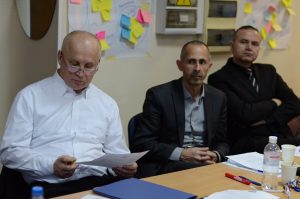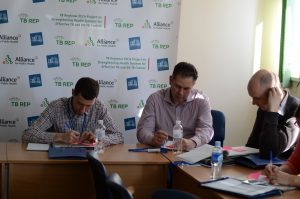Cornerstone decisions about the future of the TB Europe Coalition (hereinafter – TBEC) were made last week in Kyiv.
On 9-10 February 2017, Alliance had an honor to host Steering Committee strategic meeting of the TB Europe Coalition. Its participants included members of the TBEC Steering Committee, among them – civil society organizations – implementing partners of the TB-REP project and members of TBEC Secretariats – Global Health Advocates (Brussels), Results UK (London), and Alliance for Public Health (Ukraine). Welcoming speeches were delivered by Andriy Klepikov, Executive Director of Alliance for Public Health and member of the TBEC Steering Committee and by Fanny Voitzwinkler, Head of the Brussels Office of the Global Health Advocates.
 The meeting was convened due to a new turn in the development of TBEC as well as new challenges and opportunities in TB response, which call for strategic decisions. The Coalition was founded in 2009 and over the years became a dynamic network of civil society organizations and activists, who join their efforts to end the epidemic of tuberculosis in Eastern Europe and Central Asia (hereinafter – EECA). TBEC develops joint initiatives with TB People, which is the first network of people with experience of TB in EECA, and the Global TB Caucus, an international movement that brings together over 1,500 parliamentarians from 130 countries of the world committed to the fight against TB.
The meeting was convened due to a new turn in the development of TBEC as well as new challenges and opportunities in TB response, which call for strategic decisions. The Coalition was founded in 2009 and over the years became a dynamic network of civil society organizations and activists, who join their efforts to end the epidemic of tuberculosis in Eastern Europe and Central Asia (hereinafter – EECA). TBEC develops joint initiatives with TB People, which is the first network of people with experience of TB in EECA, and the Global TB Caucus, an international movement that brings together over 1,500 parliamentarians from 130 countries of the world committed to the fight against TB.
A very important partnership for TBEC is its participation in the TB-REP project – the first regional project in the area of TB implemented in 11 EECA countries supported by the Global Fund to Fight AIDS, Tuberculosis and Malaria (hereinafter – GF) with a component of civil society network engagement. The principal recipient of the GF grant is the Center for Health Policies and Studies (PAS Center, Moldova). TBEC together with Alliance are responsible for the support of civil society organizations within the TB-REP project. The main task in this respect is to make sure that the experience of people who were or are sick with TB are taken into account when governments are making decisions to shape people-oriented TB care.
 Members of the Steering Committee and Secretariats as well as partners invited to take part in the meeting in Kyiv during the strategic planning session formulated a joint TBEC vision “World Free of Tuberculosis” and a relevant mission “Civil Society driving the TB Response”!
Members of the Steering Committee and Secretariats as well as partners invited to take part in the meeting in Kyiv during the strategic planning session formulated a joint TBEC vision “World Free of Tuberculosis” and a relevant mission “Civil Society driving the TB Response”!
TBEC strategic goals for the nearest years include ensuring a strong and responsible civil society network in the area of TB response. It requires supporting the development of strategic partnerships and skills of
activists to impact the policy-making processes for effective response to TB. At the meeting, the following areas of TBEC activities up to 2020 were defined:
- Advocate for the transition to people-centered TB care,
- Participate in the transition processes to ensure sustainable response of countries to the TB epidemic after termination of the GF funding,
- Ensure access to the available TB drugs and diagnostic methods for all those who need it,
- Engage CSOs to monitoring and evaluation processes, in particular with regard to implementation of the national TB programs,
- Advocate for conducting research and developing new more effective drugs, vaccines and diagnostic methods.
Meeting participants agreed on the key priorities and further detailed steps required to achieve strategic development goals.

